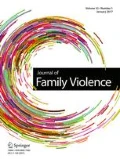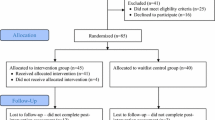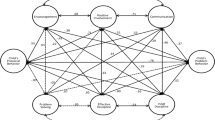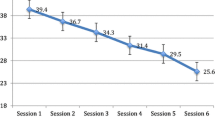Abstract
Inability to solve problems related to parenting and other aspects of daily living is hypothesized to result in frustration or inability to cope, and contribute to the occurrence of problematic parental behavior such as physical abuse or neglect. The present investigation evaluated the Parental Problem-Solving Measure (PPSM), a procedure for measuring parental problem-solving skill of maltreating and nonmaltreating parents. Subjects were 60 parents with at least one child between the ages of 2 and 12. Subjects belonged to one of three groups: (a) physically abusive and/or neglectful parents (n=27); (b) nonmaltreating clinic parents seeking help for child behavior problems (n=12); and (c) nonmaltreating, non-help-seeking community parents (n=21). Results demonstrated the interrater reliability, internal consistency, and temporal stability of the PPSM and its five subscales. Support is also provided for the convergent and discriminant validity of the measure.
Similar content being viewed by others
References
Azar, S. T., Robinson, D. R., Hekimian, E., and Twentyman, C. T. (1984). Unrealistic expectations and problem-solving ability in maltreating and comparison mothers.J. Consult. Clin. Psychol. 52: 687–691.
Azar, S. T., and Wolfe, D. A. (1989). Child abuse and neglect. In Mash, E. J., and Barkley, R. (eds.),Behavioral Treatment of Childhood Disorders, Guilford, New York, pp. 451–489.
Bousha, D. M., and Twentyman, C. T. (1984). Mother-child interactional style in abuse, neglect, and control groups: Naturalistic observations in the home.J. Abnorm. Psychol. 93: 106–114.
Dawson, B., de Armas, A., McGrath, M. L., and Kelly, J. A. (1986). Cognitive problem-solving training to improve the child-care judgment of child neglectful parents.J. Fam. Viol. 1: 209–226.
D'Zurilla, T. J. (1986).Problem-Solving Therapy: A Social Competence Approach to Clinical Intervention, Springer, New York.
Edwards, A. L. (1957).The Social Desirability Variable in Personality Assessment and Research, Dryden, New York.
Edwards, A. L. (1990). Construct validity and social desirability.Amer. Psychol. 45: 287–289.
Eyberg, S. M., and Robinson, E. A. (1983). Conduct problem behavior: Standardization of a behavioral rating scale with adolescents.J. Clin. Child Psychol. 12: 347–357.
Eyberg, S. M., and Ross, A. W. (1978). Assessment of child behavior problems: The validation of a new inventory.J. Clin. Child Psychol. 16: 113–116.
Hansen, D. J., Pallotta, G. M., Tishelman, A. C., Conaway, L. P., and MacMillan, V. M. (1989). Parental problem-solving skills and child behavior problems: A comparison of physically abusive, neglectful, clinic, and community families.J. Fam. Viol. 4: 353–368.
Hansen, D. J., St. Lawrence, J. S., and Christoff, K. A. (1985). Effectiveness of interpersonal problem-solving training with chronic aftercare patients on problem-solving component skills and effectiveness of solutions.J. Consult. Clin. Psychol. 53: 167–174.
Hansen, D. J., and Warner, J. E. (1992). Child physical abuse and neglect. In Ammerman, R. T., and Hersen, M. (eds.),Assessment of Family Violence: A Clinical and Legal Sourcebook, Wiley, New York, pp. 133–147.
Kanner, A. D., Coyne, J., Schaefer, C., and Lazarus, R. S. (1981). Comparison of two modes of stress measurement: Daily hassles and uplifts versus major events.J. Beh. Med. 4: 1–39.
Kelly, J. A. (1983).Treating Child-Abusive Families: Intervention Based on Skills-Training Principles, Plenum Press, New York.
Lahey, B. B., Conger, R. D., Atkeson, B. M., and Treiber, F. A. (1984). Parenting behavior and emotional status of physically abusive mothers.J. Consult. Clin. Psychol. 52: 1062–1071.
MacMillan, V. M., Conaway, L. P., Tishelman, A. C., Smith, G. M., and Hansen, D. J. (1987, November).Parental Problem-Solving Skills and Child Behavior Problems in Abusive, Neglectful, Clinic, and Community Families, Paper presented at the Association for the Advancement of Behavior Therapy Convention, Boston.
MacMillan, V. M., Guevremont, D. C., and Hansen, D. J. (1988). Problem-solving training with a multiply-distressed abusive and neglectful mother: Effect on social insularity, negative affect, and distress.J. Fam. Viol. 3: 313–326.
MacMillan, V. M., Olson, R. L., and Hansen, D. J. (1988).The Development of an Anger Inventory for Use with Maltreating Parents, Paper presented at the Association for the Advancement of Behavior Therapy Convention, New York.
MacMillan, V. M., Olson, R. L., and Hansen, D. J. (1991). Low and high stress analogue assessment of parent-training with physically abusive parents.J. Fam. Viol. 6: 279–301.
Robinson, E. A., Eyberg, S. M., and Ross, A. W. (1980). The standardization of an inventory of child conduct problems.J. Clin. Child Psychol. 9: 22–28.
Russell, A. B., and Trainor, C. M. (1984).Trends in Child Abuse and Neglect: A National Perspective, American Humane Association, Denver.
Sattler, J. M. (1988).Assessment of Children (third edition), Author, San Diego.
Silverstein, A. B. (1982). Two- and four-subtest short forms of the Wechsler Adult Intelligence Scale —Revised.J. Consult. Clin. Psychol. 50: 415–418.
Smith, J. M., Conaway, R. L., Smith, G. M., and Hansen, D. J. (1988, November).Evaluation of a Problem-Solving Measure for Use with Physically Abusive and Neglectful Parents, Paper presented at the Association for the Advancement of Behavior Therapy Convention, New York.
Tertinger, D. A., Greene, B. F., and Lutzker, J. R. (1984). Home safety: Development and validation of one component of an ecobehavioral treatment program for abused and neglected children.J. Applied Beh. Anal. 17: 159–174.
Tisdelle, D. A., and St. Lawrence, J. S. (1986). Interpersonal problem-solving competency: Review and critique of the literature.Clin. Psychol. Rev. 6: 337–356.
Tisdelle, D. A., and St. Lawrence, J. S. (1988). Adolescent interpersonal problem-solving skill training: Social validation and generalization.Beh. Ther. 19: 171–182.
Trickett, P. K., and Kuczynski, L. (1986). Children's misbehaviors and parental discipline strategies in abusive and nonabusive families.Dev. Psychol. 22: 115–123.
Watson-Perczel, M., Lutzker, J. R., Greene, B. F., and McGimpsey, B. J. (1988). Assessment and modification of home cleanliness among families adjudicated for child neglect.Beh. Mod. 12: 57–81.
Wechsler, D. (1981).WAIS-R manual: Wechsler Adult Intelligence Scale —Revised, Psychological Corporation, New York.
Wolfe, D. A., Fairbank, J. A., Kelly, J. A., and Bradlyn, A. S. (1983). Child Abusive Parents' Physiological Responses to Stressful and Non-Stressful Behavior in Children.Beh. Assess. 5: 363–371.
Author information
Authors and Affiliations
Rights and permissions
About this article
Cite this article
Hansen, D.J., Pallotta, G.M., Christopher, J.S. et al. The parental problem-solving measure: Further evaluation with maltreating and nonmaltreating parents. J Fam Viol 10, 319–336 (1995). https://doi.org/10.1007/BF02110996
Issue Date:
DOI: https://doi.org/10.1007/BF02110996




